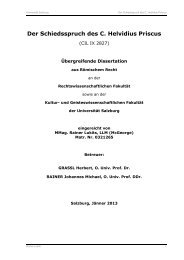(post) Keck Case Law on the Freedom to Provide Services
(post) Keck Case Law on the Freedom to Provide Services
(post) Keck Case Law on the Freedom to Provide Services
You also want an ePaper? Increase the reach of your titles
YUMPU automatically turns print PDFs into web optimized ePapers that Google loves.
free movement of goods or freedom <strong>to</strong> provide services which should take priority,because <strong>the</strong> two aspects are often intimately linked. 4 As A.G. Jacobs pointed out in Säger,it is sometimes even difficult <strong>to</strong> distinguish between goods and services. An educati<strong>on</strong>alservice could for example be provided by sending books or video-cassettes <strong>to</strong> a recipientin ano<strong>the</strong>r Member State. In this situati<strong>on</strong> <strong>the</strong>re are both reas<strong>on</strong>s <strong>to</strong> deal with this situati<strong>on</strong>under Art 34 TFEU, as well as under Art 56 TFEU. 5 Sometimes a differentiati<strong>on</strong> becomeseven more elusive. In situati<strong>on</strong>s where <strong>on</strong>ly <strong>the</strong> service itself moves – for example bycable or through <strong>the</strong> internet – <strong>the</strong> <strong>on</strong>ly difference <strong>to</strong> <strong>the</strong> sale of goods is <strong>the</strong> immaterialnature of <strong>the</strong> offered service in c<strong>on</strong>trast <strong>to</strong> <strong>the</strong> material nature of <strong>the</strong> good. 6 Because of thisclose relati<strong>on</strong> between goods and services, a different treatment of restricti<strong>on</strong>s according<strong>to</strong> <strong>the</strong> choice of legal basis would seem arbitrary in many cases.In this paper, I will analyse <strong>the</strong> relati<strong>on</strong>ship between restricti<strong>on</strong>s of <strong>the</strong> free movement ofgoods and <strong>the</strong> freedom <strong>to</strong> provide services; Is <strong>the</strong>re a uniform restricti<strong>on</strong> approach underArt 34 and Art 56 TFEU, and can <strong>the</strong> <str<strong>on</strong>g>Keck</str<strong>on</strong>g>-distincti<strong>on</strong> between product requirements andcertain selling arrangements be transposed in<strong>to</strong> <strong>the</strong> field of services? I argue that bothrestricti<strong>on</strong>-tests are based <strong>on</strong> <strong>the</strong> same principles of mutual recogniti<strong>on</strong> and n<strong>on</strong>discriminati<strong>on</strong>.Fur<strong>the</strong>r, <strong>the</strong>re is no need for a separate principle of market access becausemarket access is <strong>the</strong> aim of <strong>the</strong> restricti<strong>on</strong> test ra<strong>the</strong>r than an independent restricti<strong>on</strong>4<str<strong>on</strong>g>Case</str<strong>on</strong>g> C-390/99, Canal Satélite Digital, [2002] ECR I-607, para 32.5Opini<strong>on</strong> of A.G. Jacobs in <str<strong>on</strong>g>Case</str<strong>on</strong>g> C-76/90, Säger, [1991] ECR I-4421, paras. 24 ff.6Snell/Andenas, “Exploring <strong>the</strong> Outer Limits: Restricti<strong>on</strong>s <strong>on</strong> <strong>the</strong> Free Movement of Goods and<strong>Services</strong>” in Andenas/Roth (Eds.), <strong>Services</strong> and Free Movement in EU <str<strong>on</strong>g>Law</str<strong>on</strong>g> (OUP, 2002), p. 69, at p. 79.2




